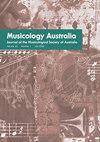East Timorese Songs From the Ancestors: Have a Care They may be Lulik
IF 0.4
0 MUSIC
引用次数: 1
Abstract
The most widespread form of music making in East Timor is singing. Songs are sung by the East Timorese for many of the occasions of daily life and often utilized in many of the rituals associated with life and death and as a means of communicating with ancestors. Ancestral worship is the foundation of the indigenous belief system of the East Timorese and integral to it is lulik. Lulik translated into Tetun (the lingua franca of East Timor) simply means, ‘sacred’ or ‘forbidden’. Lulik is a complex concept, with many layers, and the governance of lulik’s sacred rules and regulations shapes most relationships in East Timorese society. This article examines the role of traditional songs in East Timor, and factors which may affect their survival. In particular the consequences of singing them if they are believed to have lulik connotations. Can trajectories be negotiated through the lulik domain by those who wish to continue singing these songs in culturally appropriate ways? The songs selected are those with lulik implications and were recorded by the author in numerous fields trips undertaken over a fourteen-year period from 2003 to 2016.来自祖先的东帝汶歌曲:小心他们可能是卢利克
在东帝汶,最普遍的音乐创作形式是唱歌。东帝汶人在日常生活的许多场合唱歌,并经常在与生与死有关的许多仪式中使用,并作为与祖先交流的手段。祖先崇拜是东帝汶土著信仰体系的基础,是其不可或缺的一部分。Lulik翻译成德顿语(东帝汶的通用语)的意思是“神圣的”或“被禁止的”。卢利克是一个复杂的概念,有许多层次,对卢利克的神圣规则和条例的管理塑造了东帝汶社会中的大多数关系。本文探讨传统歌曲在东帝汶的角色,以及可能影响其生存的因素。特别是唱这些歌的后果,如果他们被认为有邪恶的内涵。那些希望以文化上合适的方式继续唱这些歌曲的人,能否通过路里克域来协商这些轨迹?所选歌曲是作者在2003年至2016年的14年期间进行的多次实地考察中录制的具有lulik含义的歌曲。
本文章由计算机程序翻译,如有差异,请以英文原文为准。
求助全文
约1分钟内获得全文
求助全文

 求助内容:
求助内容: 应助结果提醒方式:
应助结果提醒方式:


